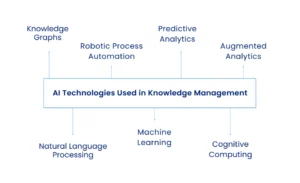AI in knowledge management is transforming how organizations capture, store, and use information. Artificial intelligence would enable businesses to automate, make more information available, and enable quicker and information-driven decisions. Less work can be achieved with the help of AI systems for repetitive tasks as well, and teamwork can be enhanced, and the management of knowledge assets across teams can be managed more easily. This change is not only making the traditional knowledge management practices modern, but it is also laying the grounds of future preparedness against innovation and growth.
What is AI in Knowledge Management?
Knowledge management with AI is transforming the process of capturing, organizing, and sharing intellectual resources by businesses. Knowledge management as a concept can be described as a systematic process of acquiring, storing, and sharing corporate information and knowledge to improve efficiency, innovation, and decision-making. Integrating both conventional methods and natural language processing and machine learning solutions into each other, companies will be able to tap into both explicit and tacit knowledge to secure a powerful competitive advantage, as well as a culture of continuous learning.
Key Elements Knowledge Management Encompasses
The future of knowledge management, empowered by AI, is holistic and proactive in utilizing intellectual assets to enhance the performance of the organization. Organizations can become innovators, flexible, and resolute by properly managing knowledge throughout the identification to application process. The primary components are listed below:
Knowledge Identification
Management of knowledge begins with the identification of valuable knowledge assets. This encompasses explicit knowledge included in systems and tacit knowledge that is held in the expertise of the employees. AI-powered tools and NLP algorithms help automate the classification and extraction of crucial insights, speeding up the identification process.
Knowledge Capture
Knowledge needs to be identified and then stored. AI-enabled automated content curation solutions create dynamic repositories, manuals, and interactive databases. Employees can also more easily share expertise using collaboration tools aided by AI.
Knowledge Organization
A good organization has readily available knowledge. Knowledge management using AI may develop taxonomies, ontologies, and knowledge maps, identifying and connecting information in a way that makes it more discoverable and more easily usable.
Retrieval and Storing of Knowledge
The types of knowledge can be numerous, including documents, multimedia, and databases. Search engines and machine learning solutions driven by AI improve the accuracy and speed of retrieval, enabling teams to work more productively.
Knowledge Sharing and Collaboration
Knowledge management involves teamwork. NLP tools and AI-infused platforms will assist employees in finding pertinent materials and specialists as fast as possible, thus facilitating hassle-free knowledge sharing.
Knowledge Application
Knowledge management is driven towards the strategic use of knowledge. With AI in knowledge management, organizations can leverage insights to solve problems, make decisions, innovate, and make knowledge a real business benefit.
Continuous Improvement and Life-long Learning
Knowledge management is not a static one, and AI can be used to make it nimbler. By, examining the use patterns and incorporating the feedback, organizations can refreeze their strategies and keep up with future trends in AI in knowledge management.
How AI in Knowledge Management Transforms Core Processes
The use of AI in knowledge management is revolutionizing organizational development, storage, sharing, and utilization of knowledge. The combination of sophisticated solutions (natural language processing (NLP algorithms and machine learning) allows companies to automate their workflows, extract insights, and enhance collaboration. The benefits of AI in knowledge management at every step of the process are as follows:
Knowledge Creation with AI
Current AI systems assist predictive analytics, whereby large data sets are automatically analyzed to discover concealed patterns and tendencies. This helps organizations to create new knowledge and discover actionable insights. As an example, an AI-driven solution can predict sales opportunities based on information about customers and market trends or detect operational inefficiencies based on CRM records. This initiative method is a good example of the influence of AI in knowledge management.
Knowledge storage and retrieval based on AI
The AI-driven systems are beneficial in gathering, categorizing, sorting, and finding explicit knowledge. Such systems can rapidly scan and screen varying content channels to provide the most pertinent information to groups and individuals. As an example, AIs are capable of automatically generalizing past legal cases to apply them to new cases, or of locating scattered information in the event of troubleshooting. This capability makes AI in knowledge management a crucial enabler of efficient knowledge reuse.
Increasing Knowledge Sharing with AI
AI promotes the flow of knowledge through connecting workers with pertinent skills and enabling collaborative intelligence. It provides a consolidated perspective on knowledge stores, and silos between departments are collapsed. To illustrate, AI-based systems can simplify real-time knowledge exchange, peer reviews, and feedback loops between marketing and sales teams. This illustrates the significance of AI in knowledge management as a force for closer collaboration.
Enhancing AI in Knowledge Application
The use of AI will enhance the use of knowledge through easy-to-use interfaces, intelligent search, and a voice-controlled assistant. The tools are used in a way that helps users to easily access and utilize organizational knowledge. Furthermore, AI is the way to equitable access to knowledge in a way that social barriers are removed and everyone can contribute. An example is that AI is able to find and prepare useful data instantly to make a decision or give real-time help in difficult assignments- another strength of AI in knowledge management.

Real-World Applications of AI in Knowledge Management
Knowledge management AI is changing the way organizations manage information by making it more accessible, actionable, and valuable. AI simplifies operations, advances decision-making, and collaboration with the assistance of natural language processing (NLP algorithms and machine learning solutions. Some of the applications that demonstrate how AI can be applied in knowledge management are as follows:
Smart Search and Context-Aware Retrieval
Intelligent search is one of the most transformative applications of AI in knowledge management. By combining semantic comprehension with NLP algorithms and machine learning, AI-powered search engines deliver contextually relevant results instead of relying solely on keyword matches. This not only makes employees get the right information fast but also when they have an indistinct query; productivity and decision making are enhanced.
Automated Content Curation for Personalized Delivery
Automated content curation, another vital application of AI in knowledge management, revolutionizes how information is delivered. High-tech algorithms are used to help predict the preferences of users, user behavior, and past historical data to suggest personalized content. This custom delivery not only contributes to increased user engagement but also simplifies the process of getting the relevant information, making the process of sharing knowledge in organizations more efficient.
Knowledge Discovery Insights Generation
With machine learning solutions, AI unlocks hidden patterns, trends, and anomalies within vast datasets. This application of AI in knowledge management empowers businesses to extract meaningful insights, drive continuous learning, and make informed strategic decisions. AI assists organizations to keep pace with the rivalry in the industry by increasing the analytical abilities of knowledge management mechanisms.
Auto Tagging and Classification of Content
Organization Tagging and classification are automated to simplify the organization of large repositories. Through sophisticated NLP algorithms, AI assigns accurate labels to documents and files, making retrieval faster and more efficient. Such a central usage makes knowledge resources easy to locate and very usable among teams.
Knowledge Base Maintenance: Automation
AI-driven maintenance is a pivotal application of AI in knowledge management. AI makes sure that knowledge bases are current, relevant, and dynamic by detecting old or duplicate material and proposing relevant updates in time. This preemptive maintenance enhances the quality of organizational knowledge and facilitates sustained flexibility.
Individualized User Experiences
Knowledge management systems based on the use of AI offer individualized suggestions depending on the position of the user, past interactions, and queries. These systems contribute to increased efficiency, engagement, and satisfaction by delivering useful information ahead of time, allowing access to important knowledge quickly.
Continuous Improvement Content Gap Analysis
AI uncovers knowledge gaps in knowledge bases by analyzing queries that have poor or no results. This AI in a knowledge management application prompts organizations to create or update content, ensuring resources remain comprehensive and aligned with user needs.
Virtual Assistants in Automated Question Answering
Virtual assistants and AI-powered chatbots can provide quick and precise answers to commonly posed questions, saving time on manual search and increasing productivity. Leveraging natural language processing, these systems streamline communication and improve the overall user experience.
Advanced Tagging and Semantic Analysis
AI extracts meaning and relationships in a text by applying sophisticated methods of semantic analysis to boost information tagging. This enhances the accuracy and context relevance of the data retrieved, enhancing the decision-making processes in the knowledge management systems.
Compliance Monitoring and Ethical
AI is also important in keeping a check on the ethical and regulatory adherence to the knowledge management processes. Transparency, accountability, and compliance with industry standards are ensured since AI raises possible concerns before they become critical by constantly reviewing data against anomalies or violations.
How to Implement an AI-Driven Knowledge Management System
The creation of an AI-driven system of knowledge management is a process that must be strategic. When properly implemented, it can assist organizations to use AI in knowledge management to enhance information retrieval, better decision-making, task automation, and keep up with future trends in AI in knowledge management. The basic steps can be seen as follows:
Set Specific Objectives and Goals
Begin by specifying the objectives of your knowledge management system with the help of AI. Identify a source of value that AI can provide, such as smarter information search, more effective decision-making, or automated repetitive tasks.
Assess Knowledge Management in Place
Determine what you currently possess regarding your knowledge management procedures, technologies, and content libraries. Identify strengths, weaknesses, and areas of improvement to learn how the role of AI in knowledge management can be used to supplement your existing system.
Find the Right AI Technologies
Select AI development services and technologies that suit your objectives. It might involve natural language processing (NLP algorithms), machine learning solutions, cognitive computing, or robotic process automation (RPA)- depending on the specific requirements of your knowledge management system.
Prepare and Integrate Data
Ensure that your data is clean, structured, and AI-ready. Adapt the existing databases and knowledge repositories to new AI tools and address the problem of data privacy, governance, and security.
Choose a Knowledge Management Platform with AI integration
Select an AI-friendly environment. Filter characteristics that include content management, group work, and user-friendly interfaces. Make sure the platform is appropriate to your company regarding size, structure, and compliance requirements.
Use AI Algorithms under Supervision
Hire a seasoned AI development company or data scientists to apply the algorithms that best fit your goals. This can include a recommendation engine, smart search, or automatic tagging of your knowledge base.
Railroaders and Change Management
Teach the train employees to operate the new AI knowledge management system. Offer suggestions regarding the utilization of AI capabilities, automation, and advanced search tools. It will be successful through the use of change-management initiatives.
Pilot Test the System
Implement a pilot program for a limited number of users to test AI features. Gather feedback, spot problems, refine algorithms and processes, then deploy it fully.
Implementation of Scale Within the Organization
Once a successful pilot is done, implement the system organization-wide. Track performance, user satisfaction, and the influence on knowledge management processes.
Develop Ongoing Improvement Practices
Institute a feedback system to keep upgrades. Assess the performance of the system regularly, take into account the user feedback, and keep informed on the future trends in the field of AI as a knowledge manager to ensure that your system remains competitive.
Enforce Data Governance and Compliance
Implement best data governance policies to ensure quality data, data integrity, and regulations. To make your knowledge management system stable, establish update, security, and access control policies.
Conclusion
The implementation of AI in knowledge management has ceased to be a competitive edge but has become a requirement for companies that want to be efficient and agile. The intelligent application of AI-driven technologies and methods can assist businesses in unlocking the unrealized potential, automating the dull operations, and bringing knowledge to a more realistic state. You can work with experts like AnavClouds Analytics.ai to develop, introduce, and optimize AI-based knowledge management systems that would fit your needs and guarantee the future growth and innovations.
Frequently Asked Questions
What is the use of AI in knowledge management?
Knowledge management is an AI that automates the way information is arranged, divided, and presented to the end-users. State-of-the-art algorithms can filter and categorize knowledge (according to relevance, importance, or user preferences) so that a team can find the most useful information as fast as possible. This simplifies the processes and improves the efficiency of the organization.
How are knowledge management and AI different?
Knowledge management (KM) is concerned with the creation, sharing, utilization, and management of knowledge and information in an organization. Artificial intelligence, however, utilizes such technologies as machine learning, natural language processors, and automation to improve such processes. Together, AI and KM enhance decision-making, automate routine work, and provide personalized insights.
What are the two kinds of knowledge in AI?
Two main types of knowledge are used in AI:
Declarative Knowledge: Facts, rules, and propositions that can be explicated.
Procedural knowledge: is the steps, actions, or algorithm to do things or solve problems.
The two forms assist AI systems to learn, adapt, and enable complex processes within organizations.
How does AI play out in a Knowledge Management System (KMS)?
The transformative role of AI in Knowledge Management Systems is to increase the accuracy, reliability, and accessibility of data. Knowledge graphs and machine learning models that are driven by AI interrelate and structure knowledge, and it becomes simpler to manage, retrieve and apply information without any hitches across departments, especially when the organization is a big enterprise.



